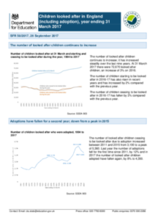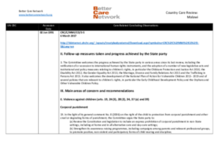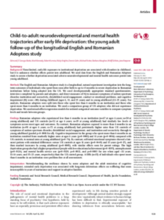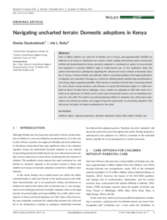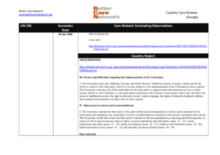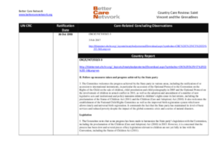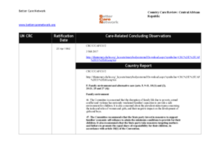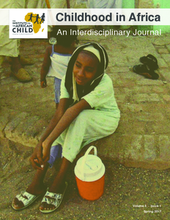Displaying 371 - 380 of 661
This study seeks to contribute to the literature on child welfare and parental drug use in the United States by answering several research questions.
This documentary from 'Real Stories' tells the stories of three young adults who were born in Romania and spent their early years in large-scale institutions.
This Statistical First Release (SFR) provides information about looked after children in England for the year ending 31 March 2017, including where they are placed, their legal status, the numbers starting and ceasing to be looked after, and the numbers who go missing or are away from their placement without authorisation.
This country care review includes the care-related Concluding Observations adopted by the Committee on the Rights of the Child.
This study used data from the English and Romanian Adoptees study to assess whether deprivation-associated adverse neurodevelopmental and mental health outcomes persist into young adulthood.
The qualitative study in this article explores adoptions in Kenya: its motivations and barriers and if an increase in domestic adoptions would be in a child’s best interest.
The Committee's recommendations on the issues relevant to children's care are highlighted, as well as other care-related concluding observations, ratification dates, and links to the Universal Periodic Review and Hague Intercountry Adoption Country Profile.
The Committee's recommendations on the issues relevant to children's care are highlighted, as well as other care-related concluding observations, ratification dates, and links to the Universal Periodic Review and Hague Intercountry Adoption Country Profile.
This country care review includes the care-related Concluding Observations adopted by the Committee on the Rights of the Child.
This issue of Childhood in Africa includes several articles related to children's care, including 'Embedding social justice in Ugandan adoption and legal guardianship cases' and 'The care and support of vulnerable children by foster care families in Uganda: Lessons in social justice and social protection.'

